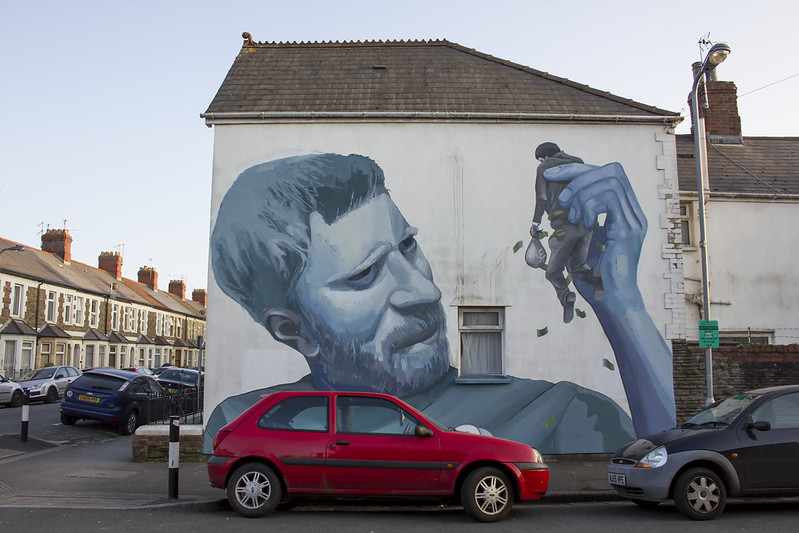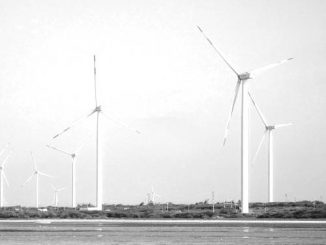Labour appear to have given up on tackling poverty and inequality before they have even got into power.
Stewart Lansley is Visiting Fellow at the School of Policy Studies, University of Bristol.
Cross-posted from The Conversation UK

Labour’s shadow chancellor, Rachel Reeves, has said that a Labour government would not raises taxes on wealth, capital gains or higher incomes. She does not, she says, see “the way to prosperity as being through taxation.”
Britain is asset rich. National wealth – a mix of property, business, financial and state assets – stands at almost seven times the size of the economy. That is double the level of the 1970s.
This has not come about as a result of investment and productivity growth. Instead, much of this private-wealth mountain is unearned – the product of windfall gains, resulting from state-driven asset inflation, the mass sell-off of former public and commonly held assets (from land to industries) and the exploitation of corporate power. As philosopher and civil servant John Stuart Mill quipped during the Industrial Revolution, it’s “getting rich while asleep”.
This has widened the wealth gap. The top tenth of Britons now holds nearly half of the UK’s private wealth. The poorest half’s share, meanwhile, has never exceeded one-tenth.
As a former US supreme court justice Louis Brandeis famously declared – a century ago – it was possible, in the US, to have either democracy or great wealth concentrated in the hands of a few – but not both.
Britain today badly fails Brandeis’s democracy test. Yet, the Labour party’s leaders have no declared plans – at least, as yet – to close this gap.
Radical thinking
In its early history, Labour drew on a number of radical, egalitarian thinkers to develop the case for a greater level of equality including via common ownership of assets. As Britain’s first professor of sociology, Leonard Hobhouse put it:
Some forms of wealth are substantially the creation of society and it is only through the misfeasance of government that such wealth has been allowed to fall into private hands.
Historian and Christian socialist Richard Henry Tawney, meanwhile, warned that assets used simply to extract payments from others, and not to perform a positive role, allowed “property without function”.
Clement Attlee, who became prime minister immediately after the second world war, accepted that poverty was essentially due to inequality and excessive private ownership. He set out to reduce wealth inequality through a mix of higher taxes, nationalisation of key industries and a commitment to collectivism.
The course of poverty and inequality is ultimately the outcome of the conflict over the spoils of economic activity. It also traces the interplay between rich elites, governments and societal pressure.
Largely as a result of Attlee’s policies, Britain achieved peak income and wealth equality and a low point for (relative) poverty in the late 1970s. This period turned out to be the high water mark of egalitarianism.
Since then, these gains have been overturned, amid a return to the high-inequality politics of the pre-war era. Child-poverty levels have doubled. A small financial and corporate elite has seized a growing share of economic gains.
Former Conservative prime minister Margaret Thatcher’s governing philosophy of a private “property-owning democracy” brought a shift from collectively to individually owned wealth. It ushered in a string of policies, from the discounted sale of council homes to the sale of cut-price shares through rolling privatisation.
Yet the key outcome of that philosophy has been an erosion of Britain’s common wealth base. A towering nine-tenths of the national asset pool is now privately-owned while the share that is in public ownership has fallen from around 30% in the 1970s to one-tenth today.
Rising inequality
The property-owning dream is bypassing the current generation. The number of first-time home-buyers now stands at less than half its mid-1990s rate.
The public’s ownership of corporate Britain has shrunk and is largely confined to the rich and affluent. More than a half of shares in the nation’s quoted companies are owned overseas up from 8% 60 years ago – largely by giant US asset management companies and sovereign wealth funds. They are displacing the share once held by UK pension and insurance funds.
Labour today remains largely silent on the critical distinction between new wealth creation that contributes to the common good, and extraction that serves the powerful few. In 1896, Italian economist Vilfredo Pareto defined economic activity as either the “production or transformation of economic goods” or “the appropriation of goods produced by others.”
Such appropriation or extraction was widespread in the Victorian era but less prevalent in the post-war decades. Today, it is once again common practice.
Wealth surges that are not linked to new value creation have a malign socioeconomic impact, including upward redistribution from those without to those with assets. Many large companies have been turned into cash cows for executives and shareholders. House price rises benefit existing property owners, at the expense of all renters.
Taxation is one way of rebalancing – if only marginally at current rates – these gains and losses. However, Labour has been eroding its historic mission of greater equality.
As Labour prime minister between 1997 and 2007, Tony Blair’s ambitious commitment to cut poverty ultimately failed because Britain’s model of extractive capitalism was allowed to continue unchecked.
On the day of Thatcher’s death in 2013, he said he’d always aimed to build on her achievements, not reverse them. He bought into the argument that surging rewards at the top were deserved and that poverty had nothing to do with the process of wealth accumulation.
History cannot be clearer, though. Poverty levels soared during the 1980s because of the sharp rise in the share of national income accruing to the rich, a trend that left less for everyone else.
Current Labour leader Keir Starmer has said that the fight against poverty requires more than “tinkering at the edges.” A successful strategy would require a new set of embedded pro-equality measures. Yet, like Blair, he appears to be downgrading the anti-inequality goal.
Thanks to many generous donors BRAVE NEW EUROPE will be able to continue its work for the rest of 2023 in a reduced form. What we need is a long term solution. So please consider making a monthly recurring donation. It need not be a vast amount as it accumulates in the course of the year. To donate please go HERE.



Be the first to comment